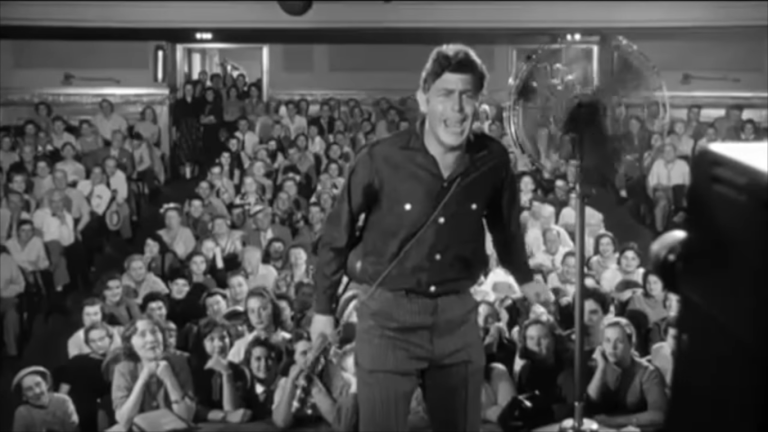Dir. Elia Kazan. Starring Andy Griffith, Patricia Neal, Walter Matthau

Here’s my Slate pitch about A Face in the Crowd: its best piece is its greatest weakness. By making Larry “Lonesome” Rhodes an Arkansas drifter, the film can call upon the services of Andy Griffith, who is absolutely electrifying. However, by making Lonesome Rhodes a Southerner, the movie falls into an old trap for New Yorkers: namely, that our hucksters are Southrons. Surely Elia Kazan and Budd Schulberg (both of whom made their lives in New York City) are influenced by a host of folks here. The one that is most frequently mentioned, amusingly enough, is Will Rogers; one can imagine Larry Rhodes as a Darkest Timeline Rogers if you squint, although what characterizes Rogers most is the wit totally missing from Rhodes’ broad strokes. Perhaps the story attempted to capitalize on Broderick Crawford’s performance as Louisianan Willie Stark in 1949’s Best Picture winner, All the King’s Men, which at least has a clear historical corollary. Yet it’s strange to me that somehow it is the rural, “country,” especially Southern element which the movie perceives as being the base of all that’s credulous and gullible in American society, led by a man with a little more gumption than the average bumpkin has. One wonders what Kazan and Schulberg would make of our recent exploiters: Gothamites Trump, O’Reilly, and Hannity, with Snohomish County-born Beck and Albany-raised, Syracuse-educated Kelly to boot. Nor is the movie sure what to do with its own New Yorkers, the Madison Avenue types whose power is completely eclipsed by Lonesome’s popularity. Are we supposed to root for the mad men? Surely Terry Malloy and Father Barry would have no special sympathy for the hucksters Lonesome Rhodes is out-huckstering. A Face in the Crowd, like Hamilton or How I Met Your Mother, is New York provincialism on display in an otherwise strong package. In A Face in the Crowd, it is particularly damaging: so much of it is incisive and intelligent, and yet it is totally willing to stereotype another Southern demagogue in lieu of looking a little closer to home for the source of the real trouble.
Without Andy Griffith, though, this movie might fall into uncomfortably preachy territory. The prospect of “Evil Andy Taylor” is, for the average person who thinks of him raising Ron Howard rather than chasing Lee Remick, almost too campy to live. But the man sold it. He is almost hypnotically good in this role. Even at a relatively modest six feet, Griffith seems to tower over everyone else at all times. His features have a Looney Tunes way of bugging out and coming through the screen; Rhodes’ trademark is a triple-barrelled guffaw screamed more than laughed. In his appeal to plain folks, he has a smidgen of Elmer Gantry in him, able to find a weakness in a potential audience with a single cool remark. (The movie, though it’s thirty years the junior of Lewis’ novel, beat the actual adaptation thereof to screens by three years.) In his first radio show, he finds his way into the heart of every woman listening with a critique of the unhelpful man sitting next to her at breakfast. He never helps wash up, Larry says, and he thinks you don’t do anything at home all day when you’re really working. One woman cleaning out her oven stops and marvels, Now how does he know that? He makes a mockery of his advertising partners, but their sales go up even when he actively denigrates the product at hand. Americans adore any sign of rebelliousness, and taking shots at an unseen financial partner (an entity which the average American rejects the existence of anyway) is a stellar method to win their hearts. Griffith can do it all: play guitar, sing, soften his voice, roll his eyes and raise his eyebrows, look directly into the camera, and own every frame he’s in.
Where he differs from a more conventional Gantry is that we never do have to see him all alone. It makes him significantly less human, which helps. Even though his introduction to us is more modest than our introduction to Gantry—Rhodes is in jail for drunkenness and vagrancy, where Gantry is a star college football player—we have the benefit of never hearing Rhodes’ voice inside his head. None of his doubts or concerns or fears shine through because of narration, perhaps because the man is never really alone. He always has an audience, or at least a companion who becomes one if you give him a minute. An old bindlestiff buddy named Beanie (Rod Brasfield) materializes after a while and comes along as a consultant of sorts. Rhodes gains the attention of General Haynesworth (Percy Waram), the CEO of the weirdly Viagra-ish pill company which buys time on Lonesome’s show; it is Haynesworth who puts him in touch with his choice for president, Senator Fuller (Marshall Neilan), “the last isolationist.” If he must reckon with himself, he does it offscreen, for given the number of people who surround him when he’s on, there’s no time for him to be alone. That’s preferable: self-doubt would not make A Face in the Crowd a whit more interesting, and Rhodes’ recklessly advancing self-confidence is what drives him as a person. At the beginning of the movie, he has no plan more certain than tarpon fishing; by the end, he laments the loss of a potential Cabinet post.
The movie presents us with only two potential heroes: Marcia Jeffries (Neal) and Mel Miller (Matthau). Marcia is corrupted by Rhodes from the beginning, all but begging him by mid-movie to marry her. Mel is suspicious of ol’ Lonesome from the get-go, when he is but a writer on the Memphis program Rhodes is newly headlining. Then again, perhaps we shouldn’t be surprised: he is Vanderbilt ’44 and one of the self-professed good guys who lose out on women to types like Lonesome. (It is, by the way, every bit as obnoxious in a movie sixty years old as it is in our own pop culture. One wants to sic Charles Dance on him to say, “Any man who must say ‘I am a good guy’ is no good guy.” Mel is a grotesquely Sorkinesque character, which would have torpedoed him from the beginning in any event, but which makes his protestations of virtue all the more limp. Broadcast News uses Albert Brooks in this particular scenario, and at least that movie lets us know that Aaron is acting childishly at best; A Face in the Crowd doesn’t even seem to know that much.) Neither one is particularly captivating on their own, although Neal does her best to keep up with the frantic pace that Griffith sets by being distinctly measured.
Neal is a rarity among thirty-year-old actresses in ’50s movies: she is totally unglamorous as Marcia. She is a face in the crowd herself, sometimes literally by movie’s end, even if she is a standout among the people of northeastern Arkansas. In Piggott, she is a respected woman with a career in a visible field. She is certainly lovelier than the average old goat running around, which isn’t unimportant in this ’50s setting. But she has fundamentally traditional values, which turns out to be an Achilles’ heel for her once she makes the move to New York. She has no language to handle a former wife for Lonesome Rhodes any more than she is capable of handling a new one. It is Marcia who finally manages to undo everything that Larry and his team have built for himself, but it is cast in the light of a chastened, wounded lover taking out her pain on the man who did her wrong as much as it is a person who cannot stand to let this demagogue live a moment longer. This is the movie’s second great flaw: it can only imagine a woman in love as opposed to a woman who does. Schulberg seems incapable of nosing out a possibility for Marcia which does not revolve around Larry any more than Edie could exist without Terry. Perhaps this would work better if the love story were better, but even so it makes our only true candidate to root for feel unfortunately hollow.
Advertisements Share this:




